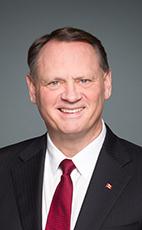Mr. Speaker, I thank the colleagues who have contributed. I would like to take a moment to thank, in particular, the members for Pontiac, Lac-Saint-Louis, and Ottawa West—Nepean for their thoughtful remarks on this motion. I thank all of my colleagues, all 11 MPs in the national capital region caucus, for their encouragement and collaboration on Motion No. 104. I would also like to pay a special tribute to and thank the Minister of Environment for her ongoing support for the Ottawa River watershed council. I look forward to working with her and her department on this important initiative.
Some 15 years ago, I wrote an op-ed in The Globe and Mail that I entitled “Overdraft at the Nature Bank”. The piece was about trying to illustrate for Canadians that our economy, our daily lives, and the way in which we order our affairs continues to draw down and rely intensely on nature. We need nature for its carrying capacity. There is no replacement for a functioning air and water filtration system, for example, as is provided through the hundreds of millions of hectares of wetlands on this planet, yet we continue to deplete wetlands without really knowing the effect on our long-term sustainability. We continue to draw down species on the planet without knowing necessarily what will happen when they are depleted or cease to exist. My point at that time was that we needed a new form of reporting and wealth measurement and that all countries should begin to measure and report on their natural capital, on the wealth that surrounds us, which is beyond the typical economic reporting we use, for example, in the budget-making process.
Similarly, this motion looks to push out our thinking in another way, which is to rethink the way in which we manage the natural assets around us.
One of the world's top economic environmental economists once said that the economy is a wholly owned subsidiary of the environment, and not the other way around. We would be foolish as a species, as a people, to knowingly draw down the capital on this planet without replenishing it or investing in it. No corporation would do such a thing. No company would ever try to run its affairs knowingly drawing down and losing its capital base. On the contrary, it would look to increase its capital base. This new form of management we are trying to examine in the study is one where we recognize a fundamental truth, which is that we are not organized by geopolitical lines; we are organized through natural lines.
The Ottawa River watershed is massive. It is mighty. It is the jewel in the crown of this entire part of our beautiful country. It does not understand that it is divided by province. It does not understand that it is divided by municipalities and that we have many different actors working within it. What we know is that it is one integral watershed. We know that it is subject to all kinds of stressors. We know that there are many kinds of activities in the watershed. For Canadians who might be listening or watching, this watershed is bigger than the province of New Brunswick. However, we do not sit down together in any one place and deal with this situation. We do not have business, first nations, governments, NGOs, labour groups, and community groups sitting down together and saying that there is one watershed, just one watershed. We can knowingly draw it down, or we can stop for a moment and look at the possibility of creating a council where we would respect the fact that it is one and understand that keeping it sustainable for all of us is the end game.
When Lord Stern did the most comprehensive study in history on climate change in the U.K., what he illustrated for the world was that we could take action on climate now. Yes, it would cost some money to deal with the climate crisis, while giving rise to all kinds of new economic activity. We could do it now and pay some price, or we could delay and pay so much more later.
I believe it is time for us to really clearly examine co-management going forward, integrated water management. That is why this motion is so important. It is time for us to admit what is true. It is time for us to come together and deal with the watershed as one whole.

